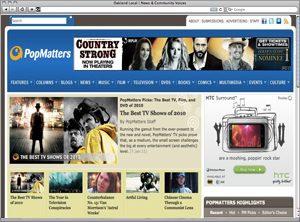“Right from the beginning, the goal was to be that bridge between academic and popular writing,” says Zupko, who still works as editor and publisher for PopMatters. As a result, the site still tends towards lengthy, well-researched pieces that require real expertise from their authors. One thing the site embraced early on was the Internet’s limitless space. Articles regularly push more than 2000 words, while even reviews of more obscure albums or films run at more than 1000.
Since its inception, PopMatters has gradually moved from updating a few times a week to a daily publishing format in order to compete with other sites covering the same material. The site currently boasts more than one million unique readers monthly and has dozens of regular contributors from around the world. PopMatters encourages its writers to “explore their own interests and their own voices,” says Zupko. “As long as they do smart, interesting writing, that’s what we care about.”
Of all its coverage, the site is most ambitious with its special sections, which have offered in-depth coverage of cultural topics ranging from the director Akira Kurosawa to Bob Dylan’s 1975 album Blood on the Tracks to the cult action film Hellboy. The scope of these projects is staggering, regularly featuring upwards of twenty articles with lengths ranging from 1000 to 4000 words or more. These special sections are like a quarterly devoted entirely to one subject–only frequently much larger.
In fact, one of these special sections, centered on the work of writer and director Joss Whedon, has been expanded into a nearly 500-page book. The book on Whedon is the fifth entry in an ongoing series in which PopMatters extends its already thorough web content “to in-depth, book-in-hand explorations on an equally wide range of topics.” The PopMatters Book Series was launched in 2008 with The Solitary Vice: Against Reading, a “tongue-in-cheek polemic” – and Publisher’s Weekly Best of Books pick – in which author Mikita Brottman tests popular assumptions about the value of reading. Other book topics have included humor as subversion in rock music; the influence of “apocalypticism” on American pop music; and contemporary century youth culture in China.
The lack of length constraints has led contributors to write more thoughtful articles than found almost anywhere else on the Internet. While PopMatters now publishes more blurb-length pieces as well (in order to stay on top of current news), the in-depth special sections are more definitive of its identity, and in the past couple years they have appeared with increasing frequency.
Unfortunately, while PopMatters is able to insist on quality over quantity, it’s not able to pay any of its contributors other than its two-person full-time editorial staff. All of the site’s revenue goes towards maintaining its tiny staff and keeping the site online. Zupko has little interest in covering celebrities, sensationalizing headlines, or otherwise pandering for page views–so although the site is still growing its visitors and slowly trying to expand its content into visual and theatrical arts, it seems unlikely that its unpaid contributions policy will change anytime soon.
PopMatters is still a business, but given that it’s owned by its editor, the site remains more interested in the quality of its material than making money. “We were never looking to create a site for a huge mass audience, we were looking to create a site for a large niche audience,” Zupko says. “But there are a lot of readers who are still interested in long-form writing, and I think we fill that niche well.”
 CHICAGO, ILLINOIS — Back when the Internet was still the sole purview of academics and nerds, journalist Sarah Zupko, then working in marketing at Tribune Media Services, founded a site catering to those specific audiences. That site was not in fact PopMatters, but it was a progenitor of sorts, providing web links for researchers studying pop culture. During the years that followed, Zupko’s interests shifted from content aggregation to content production, and in 1999 PopMatters was born, featuring in-depth cultural criticism with an academic flair.
CHICAGO, ILLINOIS — Back when the Internet was still the sole purview of academics and nerds, journalist Sarah Zupko, then working in marketing at Tribune Media Services, founded a site catering to those specific audiences. That site was not in fact PopMatters, but it was a progenitor of sorts, providing web links for researchers studying pop culture. During the years that followed, Zupko’s interests shifted from content aggregation to content production, and in 1999 PopMatters was born, featuring in-depth cultural criticism with an academic flair.
